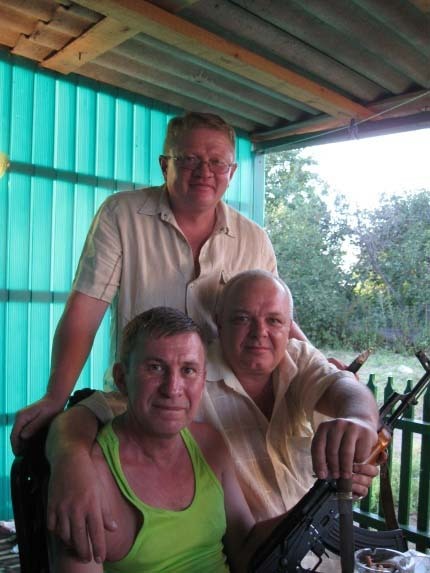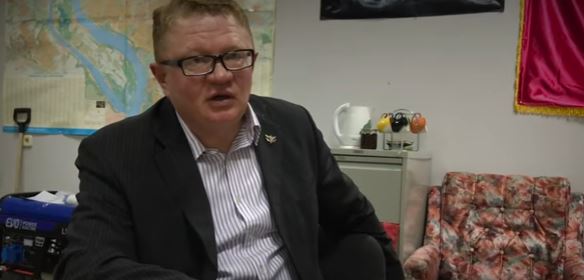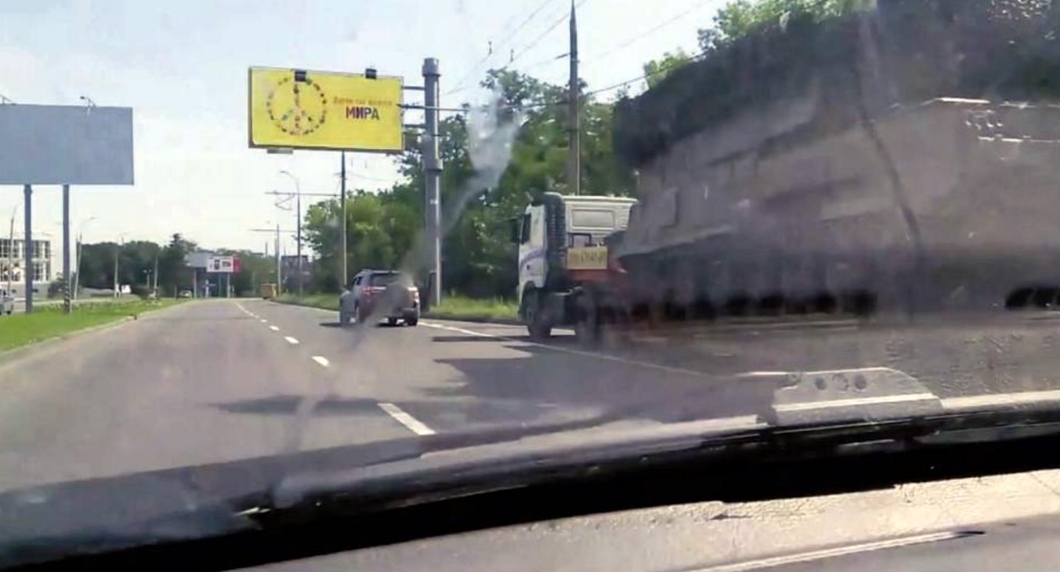In the fall of 2016, the Joint Investigation Team (JIT) tasked to investigate the catastrophe which killed all 298 people on board presented their conclusions, according to which the Malaysian Boeing was downed by a rocket from a Buk missile launcher which fired from the town of Snizhne in Donbas, at that moment under the control of the Russian hybrid forces of the "Donetsk People's Republic" ("DNR"). Although JIT did not point fingers, open source research by Bellingcat shows that the Buk was operated by the Russian 53d brigade which brought it from Kursk.
Read also: One year later, what do we know about the MH17 tragedy | Infographic
However, the search for those on top who gave the command is still ongoing. The day after flight MH17 was downed above eastern Ukraine on 17 July 2014, Ukraine's Security Service (SBU) released a wiretapped conversation between leaders of the Russian-backed militants and the bosses in Russia. In them, a certain "Khmuryi" was heard discussing how a Buk-M which released the missile shooting the Boeing airplane down was in the possession of the Russian-backed militants of the "Donetsk People's Republic" (read transcript here). The JIT investigation, which also made use of this intercept, shows "Khmuryi" as the person responsible for transporting the Buk missile launcher from the Russian border on territory controlled by the Russian-backed militants. Official Moscow dismisses the JIT's conclusions as "internet fakes."
https://www.youtube.com/watch?v=MVAOTWPmMM4
The SBU identified "Khmuryi" as Sergey Nikolayevich Petrovsky of the Russian Main Intelligence Directorate. However, investigators from Infornapalm and Bellingcat identified his real name as Sergey Dubinsky, a Russian war veteran who fought in the Soviet-Afghan war and later in Chechnya, and later served in the 22nd Spetsnaz Brigade, a unit connected to the GRU, Russia's Main Intelligence Directorate.
In February 2017, Bellingcat wrote that Dubinsky was granted the higher rank of major general in the "Donetsk People’s Republic" in August 2014 and later relocated to the Russian Federation after being expelled from Donetsk for alleged financial crimes. The publication of Novaya Gazeta now seems to dispel all doubts that the identity of "Khmuryi" is indeed Sergey Dubinsky.
An abridged translation of Novaya Gazeta's report, edited for clarity
The newspaper found a person who confirmed that the voice of "Khmuryi" on the SBU's intercept indeed belongs to Russian colonel Sergey Dubinsky. It was Serhiy Tiunov, a Ukrainian citizen, leader of the Ukrainian city of Zaporizhzhia's self-defense forces, and veteran of the Afghan war, who recognized his former comrade-in-arms. Tiunov told Novaya Gazeta that he was a friend of the former Head of the "Main Intelligence Directorate of the DNR" Sergey Dubinsky and discussed the aftermath of MH17 with him.

In the late 1980s, Tiunov and Dubinsky served in the reconnaissance company of the 181st regiment in Afghanistan. When the war in Donbas was only starting in the summer of 2014, Tiunov was able to release several dozens of Ukrainian soldiers from captivity in militant-controlled territory thanks to his acquaintance with Dubinsky. Now Tiunov fears for his life, saying that his former comrade is a key witness in the MH17 catastrophe and can name those who are responsible for the downing of the passenger airliner, thus carrying direct responsibility for the civilian deaths.
Novaya Gazeta spoke with Tiunov in the HQ of the self-defense forces of Zaporizhzhia, which is located on the premises of one of the schools. Tiunov was coordinating the transfer of a new generator to Zaporizhzhian volunteer soldiers protecting the coastal and frontline city of Mariupol from an assault of Russian hybrid forces. Before the war, Tiunov worked as a lawyer. During the spring of 2014, he organized the local pro-unity self-defense forces which fouled Putin's "Novorossiya" plan to split up Ukraine. One time he together with friends prevented a column of pro-Russian activists from entering the city and yanked out the Russian flags sticking out of the windows of their cars.
Read more: Meet the people behind Novorossiya's grassroots defeat
"Many of my Russian friends wrote: 'fascist, punisher, junta supporter.' I didn't expect this, it was disappointing that my comrades were so infected by propaganda," Tiunov tells. But Dubinsky, unlike his other Russian friends, didn't repeat any propaganda slogans, despite opposing the Euromaidan revolution like most Russians. Tiunov and Dubinsky held discussions, each holding to his own truth.

Tiunov tells Dubinsky was a retired Russian officer, but the May 2014 raid of a group of Ukrainian volunteers on the village Velyka Novoselka close to Donetsk where Dubinsky lived, searching for "Novorossiya" supporters, was the last straw - he suddenly went to fight for the "DNR."
The two men became friends only in 2010, at a new internet forum for veterans. Dubinsky invited his Ukrainian friends to visit him in the village Velyka Novoselka where he lived in the Donetsk Oblast from 2004, after returning from the Chechen war in the rank of a colonel and eventually married.
"Karakhan," "Khmuryi," "Nehoroshyi," "Petrovskyi," are all callsigns and nom de guerres of Sergey Dubinsky
In September 2014, several hundred Ukrainian soldiers were in captivity on "DNR" territory after the battle of Ilovaisk. Few managed to make it out of the cauldron. Tiunov was able to drive a group of his people out but was wounded in the process. After finishing hospital treatment, he attempted to contact "DNR" commanders in order to negotiate the release of one more soldier. He received an SMS with a phone number and the text "A person from the military reconnaissance from that side. Call him. You'll be surprised who answers you."
Tiunov dialed the number immediately and blurted: "I am a lawyer from Zaporizhzhia, I want to enter negotiations to release my countryman..."
"Why don't you speak like a normal guy, Redhead," laughed a hoarse voice at the other end. "Let's take it step by step. How many people, from where, who will take them away?"
Tiunov recognized the voice but couldn't believe it.
"Who am I talking to?" he asked.
"Come on, it's 'Karakhan'! - Dubinskyi's voice answered. - 'Khmuryi.' Well?"
At Tiunov's request, Dubinsky released the captive Ukrainian soldier. A week later, Tiunov called again, pleading this time about a group of Ukrainian soldiers from Zaporizhzhia. "No questions asked - take them! Feeding and guarding them is an expensive fancy," "Khmuryi" agreed. Then, Tiunov rented the bus to transfer the soldiers himself and in October 2014 departed to a meeting with Khmuryi to "DNR"-controlled Donetsk. Part of him was afraid, the other knew that he would not be harmed - the word of an Afghan veteran was set in stone.
At the place of the meeting, Tiunov was met by armed and masked "DNR" fighters. "Khmuryi" appeared a few minutes later, accompanied by guards who Tiunov identified as Chechen Commandos who Dubinsky served with during the Chechen war. The captive soldiers boarded the bus.
Tiunov stepped aside for a conversation with Dubinsky. "See how life has turned out, Serhiy," "Khmuryi" said. "We were on the same side in Afghanistan, and now we're fighting against each other. I still can't understand why you're on the junta's side."
"I couldn't restrain myself and answered: but it was you who, like bandits, shot down the passenger plane!" Tiunov recalls. "I saw by his face that he was hurt, he took it personally. He said: 'I don't suppose you think I did it [myself]?' And then he pointed up: 'The freaks from Moscow did it!'"
"This conversation was unpleasant for him because he needed to find excuses. After all, he was a military person and not a bandit," Tiunov continued. "[It was obvious to me]: he understood that he is involved and partly guilty of the death of civilians. So he quickly switched the conversation: time for you to leave, because we'll be caught and both you and I will be mortared."
Then, the soldiers from Zaporizhzhia were released without any demands in return. But the 5 captive fighters of the Donbas battalion which Tiunov wanted to release a month later were traded for 2 "DNR" militants. When Tiunov and Khmuryi met, they conversation touched upon the Boeing once again. Then, Khmuryi espoused the Kremlin-developed legend that the plane was shot down by a Su Ukrainian jet. They never met afterward.
Read also: The most comprehensive guide ever to MH17 conspiracies
Tiunov doesn't consider Dubinsky a bandit.
"He fought in the Donbas as a soldier. Yes, probably, at the criminal orders of his superiors. But I am 100% sure: if he knew it was a civilian airliner and if the launch of the rocket was in his power, he would have never agreed to destroy civilians. Moreover, I heard from him personally: 'It was the Moscow *** who did it!' And I will never agree with him being made the largest culprit, as it is being done now."
Does Tiunov recognize the voice of Dubinsky in the SBU intercepts? He takes a pause before answering:
"Let's put it this way: the person, who in the SBU recordings is labeled as militant "Khmuryi," is very similar [in his voice] to Dubinsky. I assume that it is exactly him."
He later repeats that he doesn't consider Dubinsky responsible for the catastrophe. "He is the key witness, but not the killer. And also his is my colleague. I want him to stay alive. I think he didn't press the button of that Buk, only coordinated its transportation."

When Pavel Kanygin found Tiunov, he wasn't ready to talk about "Khmuryi" at once. He kept silent about his acquaintance with the figurant of the "MH17 case" all these 2.5 years. He says he didn't know how to help his colleague without harming him. Tiunov attempted to reach his comrade a few more times. "I wanted to help him get out of the situation, and he doesn't even respond to my messages. The ring is tightening around him. I really want to help him."
Kanygin offered Tiunov to pass on a message for Dubinsky and departs to Russia's Rostov-on-Don to personally hand the 5-minute long recording to Dubinsky, who is living in a closed military settlement in a village in the outskirts of the city. Dubinsky picks up the phone, isn't surprised by the news from Tiunov, but responds that he is not in Rostov and will return only in a week. He promises to call back in two days, but never does, and doesn't answer calls. Kanygin recorded the phone conversation. Three weeks later, Dubinsky is no longer interested in the message Kanygin holds: he says that he talked with Tiunov and will receive it by email. But Tiunov denies this conversation taking place.
According to significant figures of the "Russian spring," Dubrovsky was expelled from the "DNR" for fraud and seizing property from locals. Novaya Gazeta was unable to confirm these allegations but found out that after returning to Rostov in 2015, Dubrovsky registered a few cars in his name, including the luxury SUV Volkswagen Touareg.
Dubinsky actively uses his facebook account to engage in open conversations with other Russian-backed leaders of the hybrid "republics" in Donbas. According to a book by the ex-Head of the "DNR Ministry of State Security" Andrey Pinchuk, Dubinsky was the "DNR deputy Minister of Defense" and headed the military reconnaissance of the self-proclaimed republic.
Forensic expertise of the voice
Novaya Gazeta commissioned a phonoscopic investigation to compare the telephone recording of Kanygin's call with Dubinsky and the voice of "Khmuryi" from the SBU intercept recorded in July 2014. The Russian bureau Versiya, after taking a day to ponder whether they could take on such a politically significant case, said that the technical qualities of the recording were insufficient to reach a conclusion, but a linguistic analysis done by an officer from Rostov (who was however trained not in linguistics but radioelectronics, not linguistics) assured them that the SBU recording featured an imitation of Dubrovsky's voice.
Experts from the Institute of Neuroscience and Physiology at the University of Gothenburg in Sweden, who Novaya Gazeta offered to conduct an alternative investigation, were of a different opinion. The analysis was done in the laboratory Voxalys, which carries out forensic examinations by order of the Swedish prosecutors, police, and courts, done in the "blind test" manner without context immersion according to the instructions of the International association of criminal phonetics and acoustics (IAFPA). The experts were not briefed on the content of the conversations, in order to avoid any political influence.
The Swedish specialists analyzed only the technical (acoustic) parameters: the tone, frequency, and timbre of the voices. The analysts used a 9-point scale, where +4 is the maximum probability of the correspondence of the voices, -4 - the minimum probability, and 0 means it was impossible for the experts to come to a conclusion. After 10 days of investigating, the Swedes prepared a forensic conclusion which supported the hypothesis of the two voices being identical, giving it a +2.
+2. The result of the examination support that the compared speech material originated from the same person.
Novaya Gazeta is confident that the voice of "Khmuryi" belongs to Dubinsky. His colleague Tiunov insists that Dubinsky did not have the intent to attack the plane with civilians, but that a mistake took place.
Novaya Gazeta continues gathering testimonies.
[hr]
Related:
- One year later, what do we know about the MH17 tragedy
- Placing MH17 disaster in context, ahead of Dutch report
- Russia's MH17 narrative: a year of self-incrimination
- MH17: Crime without punishment
- The aftermath of MH17
- The most comprehensive guide ever to MH17 conspiracies
- Bellingcat narrows list of possible MH17 culprits from Russian 53rd Brigade to 20 servicemen
- Ukraine had no reason to close its airspace above 10 000 m before MH17 disaster | Infographic

